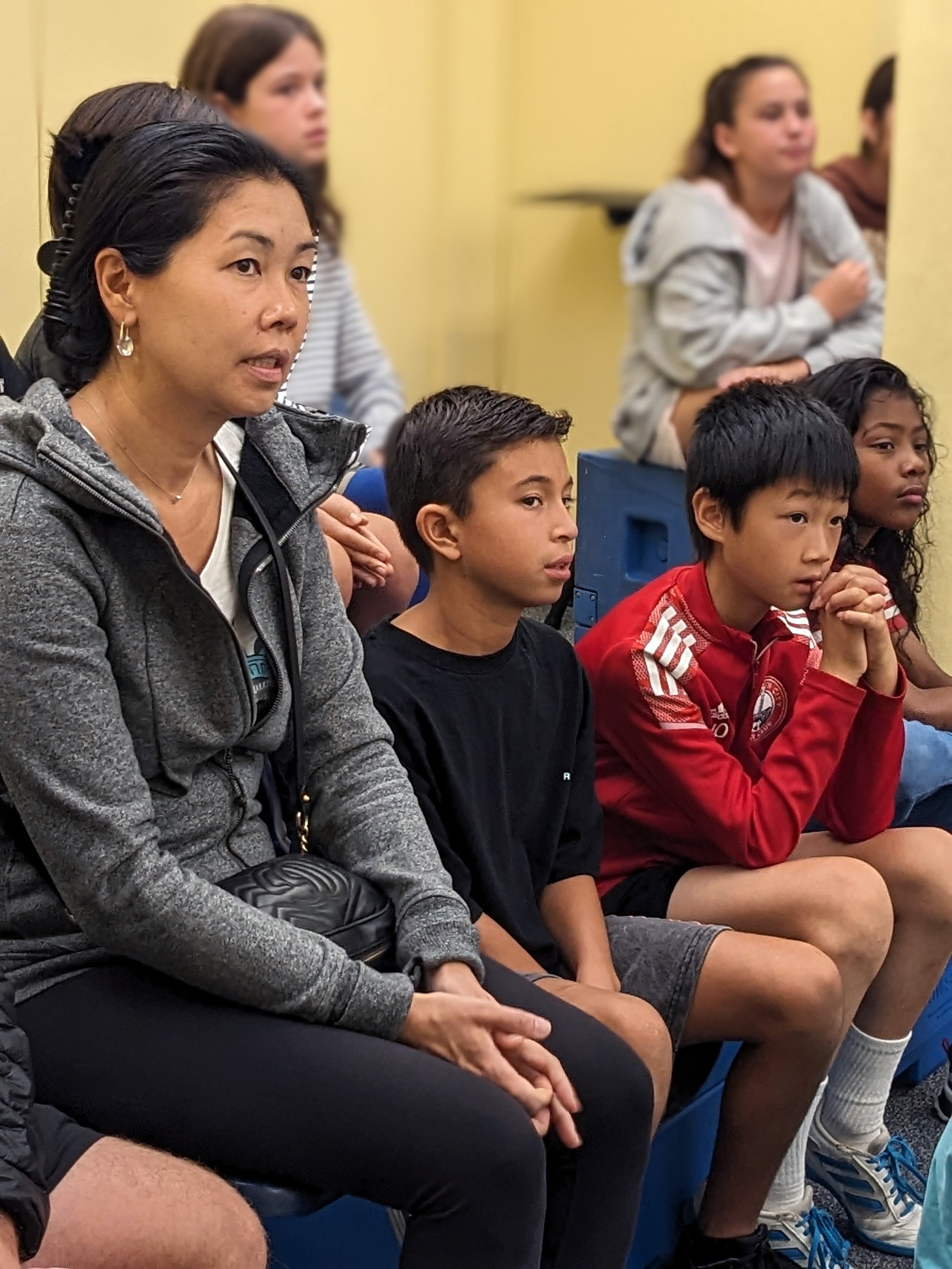
Daily Worship
An Invitation
Worship at Mustard Seed is a continual invitation to a spiritual moment. Our three- and four-year-old students’ introduction to worship features the Bible story of creation. Each day of the seven days of creation is examined in turn over two days of worship. One of our initial hopes for our preschool students is that these stories will instill a foundation of awe and wonder for the diversity and abundance of God’s creation.
Those themes are further integrated with science and art exploration in the classroom. So, for example, when students hear that on the second day, God created water and divided it between the water above (sky) and the water below (land), they talk about the science of clouds as evaporated water. They see photos of different types of clouds identified in a book and observe them on walks. They cultivate their fine motor skills to create tissue clouds and twirled paper waves, and their social skills to build group collages of those pieces. They paint clouds while learning the proper use of a brush in the shared space with their art teacher.
Worshipping Together as a Community
In daily worship, our students learn generosity, compassion, and grace together. We learn lessons about treating each other with kindness, God’s love for us, and overcoming adversity through Bible stories. We want students to know their identity in this world as a beloved child of God, and see others as the same. The Bible readings, stories, skits, and props help students to see their life and work with meaning and purpose.
Families are always welcome and encouraged to attend! Worship is the place where we celebrate birthdays, make music together, and practice leadership roles. For younger children, morning worship may serve as a soft transition from family time to school time. As an interdenominational school, we welcome students and families from all faith backgrounds and denominations.
We also welcome students and families with no faith background. As global trends show a shift from institutional to a personal understanding of spirituality, we often hear from families that they find deep meaning and community in our daily gatherings. Families who may not be seeking faith formation find this daily practice, for a few precious minutes with their children in the morning, personally beneficial in adding a spiritual depth to their lives. In much the same way that some people seek yoga or meditation, our families tell us that engagement in the service provides space in their lives for reflection and fellowship.
What Kind of Christian School Are You?
Due the worship rotation, third grade teacher Cindy Kuperus happened to be the one scheduled to lead prayer services the day after an elementary school shooting tragedy. (Sandwiched between opening and closing singing in the 12 minutes of Lower School daily worship are 4-5 minutes where teachers take turns presenting a Bible story or lesson that follows a prescribed curriculum, and then guiding prayer.)
Students had been studying the adventures and Epistles of Paul in the Bible over the past several weeks, and Ms. Kuperus had been given Romans 12 for the week of letters to churches.
“I had planned to avoid the assigned verse for the day, ‘Don’t let evil overcome you, but overcome evil with good,’” because it felt too heavy, abstract and harsh for this age. I had actually prepared a lesson around, “Contribute to the needs of the saints; pursue hospitality to strangers,” says Ms. Kuperus.
“Then the devastating shooting occurred. I truly felt the Holy Spirit working through me. I wanted the children to feel empowered in the face of this tragedy, so I returned to the primary lines.”
After reading Paul’s words aloud at worship, Ms. Kuperus offered three ways for younger students to work when confronted with evil in the world:
Sing: The students had just completed work on their spring concert. Using the moving spirituals of the American slaves as an example, she suggested that singing can help students feel connected to others and lift their spirits.
Share: The first grade is currently conducting a service project to collect commodities like laundry detergent, soap, and toothpaste for The Lighthouse, a project run by the Episcopal Churches of Jersey City. She proposed that contributing is a concrete action that students could take to overcome evil.
Pray: Communicating with God and asking for God’s help and comfort is doing something. I believe that God’s work happens through prayer. When Jesus was innocent and on the cross, he offered a prayer for those who persecuted him, “Father, forgive them for they know not what they do.”
Ms. Kuperus’ sharing goes to the heart of our answer to the question, “What kind of Christian school are you?” Rather than composing a hollow social media post in the standard political parlance of the day or at the other end of the spectrum, giving a speech to students that could elevate alarm levels during an era of so much alarm, Ms. Kuperus offered a sense of connection and compassion that forms the center of our daily lives at Mustard Seed. These practices are readily available in a place where all students are beloved children of God, and we care for God’s world together.
If her students had not heard about the shooting, that day’s worship service would have felt like any day’s worship service. But for those who felt alienated or sad or had come to school knowing that their peers in Texas were in this unsafe place, Ms. Kuperus seamlessly provided both a philosophy and practical strategies in a space where students have enjoyed community and tackled complex questions since they were three years old.
“Children know when you are not being authentic,” says Ms. Kuperus. “I wanted to help them navigate their thinking with such a complicated problem and to feel empowered. I closed with the prayer that Jesus taught us. I don’t know if you noticed, but I repeated ‘deliver us from evil’ three times.”
We know the enduring value of daily worship from talking to our young alums. What we practice as a community, espouse in our beliefs, and enact in our ethics, enriches our graduates as they live complex lives in an ever-changing world.
A Spiritual Connection
A consistent theme in the annual autobiographical profiles composed by our eighth grade students mirrors a tenant of our Portrait of a Graduate brochure under the heading: A Child of God. A Mustard Seed graduate exhibits self-knowledge and understands that they live a life of meaning and purpose.
Profile after profile convey the student’s desire to make the world a better place and their confidence that they will achieve their goals. They often express an intention “to be known as a person that inspires others,” and a “hope to be a great friend to . . . future classmates” after leaving Mustard Seed. One student communicated the concept in practical terms: “He loves exchanging ideas and thought processes with teams to work together and make the best thing they can make.“ Another student wrote, “After almost a whole lifetime of study in a very kind environment, [he] is ready to help the world by creating solutions for small or big problems.”
Plunging into the Bible’s splendors and mysteries during daily worship together provides space for the contemplation of the vastness of the world and the validity of adopting a positive outlook in life. The invitations to meditation every day support a life of active engagement, connection, and commitment to serve others.
That view is echoed by young alum and successful entrepreneur, Brynn Wallner, MSS ’04 who is based in New York City and travels internationally for her business, Dimepiece.
“At Mustard Seed, you learn to seek and recognize the goodness and beauty in the world. I am not a religious person, but I do consider myself to be a spiritual being,” says Brynn. “As a child in worship, I heard stories about the struggle between good and evil. Rather than brushing complex issues under the rug, I considered difficult philosophical questions along with my Mustard Seed peers at a very young age. What is the value of being kind to your neighbor? Jesus was kind to the lepers and modeled behavior for my current encounters with the unhoused in my neighborhood.”
“That sense of wonder was always present. I can still remember the Time to Reflect during Lent. That opportunity to learn to embrace silence and to reflect when I was six years-old was unique and meaningful. Only Mustard Seed could have provided that opportunity.”








